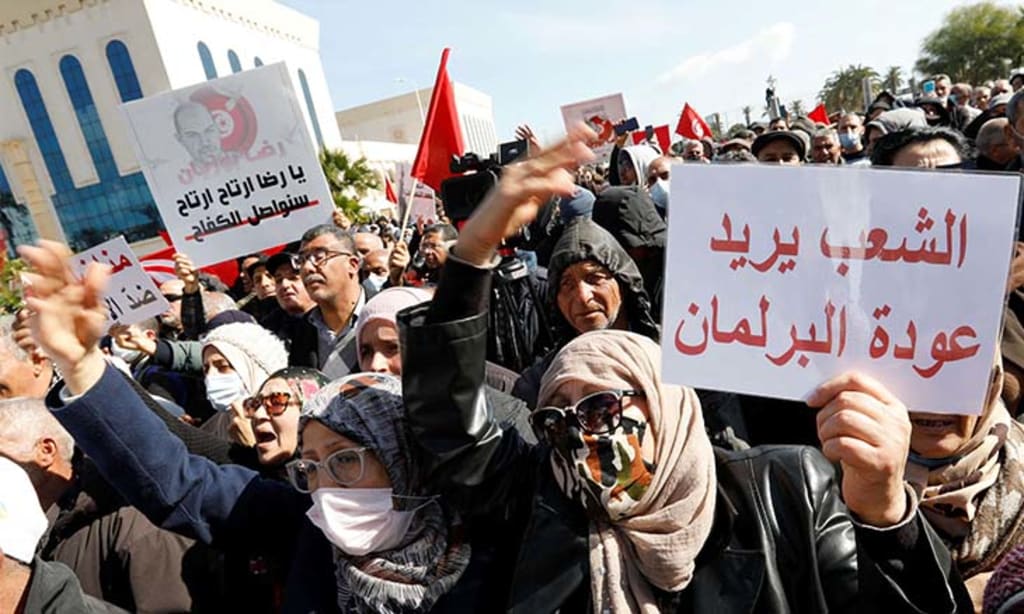
Write Tunisia or Qais Said in any search box and wait for the results:
the Tunisian president dissolves the Supreme Judicial Council, judges refuse and threaten to escalate, Tunisian parties condemn the return of tyranny, a demonstration of the “Citizens Against the Coup” movement, ambassadors of the Group of Seven major countries express their concern about dissolving the Supreme Judicial Council Likewise, the Secretary-General of the United Nations and the US State Department, the European Union’s foreign policy commissioner, says that the European Union may soon discuss suspending financial aid to the Tunisian government, successive statements of condemnation from “Amnesty International” and “Human Rights Watch” and others, which are not presented in the Tunisia negotiations. With the International Monetary Fund, the World Economic Forum warns of major risks threatening Tunisia, including the collapse of the state, a crisis in public finances, a bewildering delay in the payment of salaries, a weak demand for strange electronic consultations...etc.
This is Tunisia's news today. There is not a single positive headline that you can find in newspapers, communication sites, research and studies centers pages, or news bulletins on international radio and television, with confused questions about the country's future.
Perhaps the image of Tunisia abroad and the talk about it in international statements and the media has never been so extensive and bad, yet the authority in Tunisia is either unaware of the danger or it is not concerned about it, and both are more dangerous than the second. What we have seen so far is that Said once mocked the credit rating of his country, and once the concern expressed by the ambassadors of the seven major countries about the dissolution of the Supreme Judicial Council, noting each time that Tunisia is free and sovereign until he almost approaches this enthusiastic speech with Arab and foreign leaders who entered In disputes with major countries that led to a state of enmity or wars, although he himself did not hesitate more than once to discuss his country's internal issues with foreign leaders and ambassadors.
What increases the absurdity of what is happening is that Tunisia is not a rich country capable of dispensing with others, assuming that the rich countries dispense with others. Rather, it is a country that has been stable since its independence in 1956, on the condition that it maintains good relations with everyone.
Its first president, Habib Bourguiba, was well aware of this. Despite his distinguished relations with France and the Western camp in general, he did not enter into any hostility with the Eastern camp, and his Arab relations remained balanced and his hand extended to everyone, except for limited crises that did not come out of diplomatic channels except Rarely, and so was Zine El Abidine Ben Ali, until those grand outlines became the policy of the Tunisian state, no matter who was its president.
Tunisia is a small country with no great wealth. It depends mainly on its human wealth, tourism, the agricultural sector, phosphates and some oil. For this reason, throughout its history, it has relied on the best economic and trade relations with the East and West. Even when Bourguiba or Ben Ali’s relations with one party or another worsened, they generally remained in the form of media campaigns in which senior state officials did not engage, let alone the head of state, in addition to the fact that the country was not at the time as fragile as it is now in terms of economic fragility, political blockage and confusion social.
Is it a high sense of supreme national responsibility for any responsible head of state to unleash some strife when he is in dire need of good relations with the United States, which has the final say in the International Monetary Fund and other international financial institutions?! And in dire need of better relations with the European Union and all its countries, including France, the first foreign investor in the country?! And in dire need of a country like Turkey, with which many of its former opponents returned to build bridges with it, and singled out its president with the greatest receptions?! Or Qatar, the first Arab investor in the country?! Especially when those who thought they supported him did not come to support him in the coup against the constitution and institutions and the complete scattering of the political and legal scene of the country. Tunisia needs everyone and has always been aware that it is not in its interest to align with anyone or be hostile to anyone.
Tunisia's reputation abroad was never as bleak as it is today, nor was it so international isolation, with many questions raised by writers and analysts about the country's future if it remained on this path.
Tunisia's reputation is a real and priceless capital. It is very sad that its Arab and international reputation has changed from an inspiring state in democratic transformation and institutional building, despite all the impurities and pitfalls, to a state governed by the very arbitrary mood of one man, who recently declared that he "knows and understands international balances" but nothing. This is always evidenced, especially when we see him daily in the process of transforming Tunisia, with its strange policies and the negativity of most Tunisians towards it, into a "leader's brother country", according to the description of former President Moncef Marzouki.





Comments
There are no comments for this story
Be the first to respond and start the conversation.